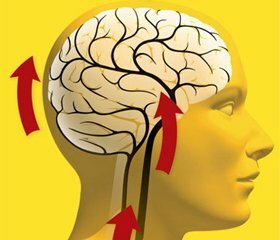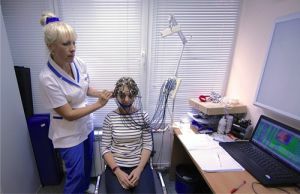 Hypertonic encephalopathy belongs to the category of serious enough diseases, which are characterized by a syndrome of circulatory disturbances in the brain due to severe intracranial hypertension.
Hypertonic encephalopathy belongs to the category of serious enough diseases, which are characterized by a syndrome of circulatory disturbances in the brain due to severe intracranial hypertension.
This pathology occurs most often at the age of 55-60 years. The first symptoms that indicate the disease should be the reason for initiating therapy.
Contents
- The essence of the disease
- What happens in the brain with hypertension?
- Symptoms in acute and chronic course
- Complex of diagnostic procedures
- Features of medical care
- Prophylaxis
The essence of the disease
Hypertensive or, as it is also called, hypertensive encephalopathy is a disorder or disorder of the brain that develops in the malignant form of hypertension, according toICD-10 this disease is coded under the cipher I67.4.
Pathology revealed Oppenheimer in collaboration with Fishberg in 1928.Since then, a lot of time has passed for research. Thanks to this, it was possible to establish that this type of encephalopathy is observed with eclampsia, sudden increase in pressure, hypertensive crisis, acute renal neuritis.
The greatest danger is encephalopathy, which appears due to hypertensive crisis, as it is accompanied by acute symptoms. As a result, a person has serious cognitive disorders, tissue necrosis, problems in the work of many organs.
What happens in the brain with hypertension?
Even a single increase in pressure adversely affects the health of the nerve tissue. In this case, the regulation of the  tone of arterioles and venules is impaired. Small vessels of all tissues are involved in the pathological reaction, however, the target organs, kidneys, heart and brain, suffer to a greater degree.
tone of arterioles and venules is impaired. Small vessels of all tissues are involved in the pathological reaction, however, the target organs, kidneys, heart and brain, suffer to a greater degree.
With a slight increase in pressure, the mechanism of constriction of small vessels is triggered. This prevents their rupture and stabilizes the pressure in the arteries.
With constant hypertension, there is an increase in the muscular layer of the vessels. This causes the narrowing of their lumen with a decrease in blood perfusion. As a consequence, the brain and other organs suffer from constant hypoxia - oxygen deficiency. This entails the development of hypertensive encephalopathy.
Aggravating factors
The main cause of the disease is the increase in pressure to critical levels. This can occur under the influence of congenital and acquired factors. The first group includes disorders of the vascular system - for example, the formation of an aneurysm or the weakness of the walls of blood vessels.
Under the influence of acquired factors, spasms of cerebral vessels appear and ischemia develops. They include the following:
- acute nephritis;
- hypertensive crisis;
- stroke;
- excess cholesterol and platelet count;
- excessive consumption of alcoholic beverages;
- Drug poisoning;
- overdose of medications;
- pathology of the brain.
Due to the effects of these factors, blood pressure can be constantly increased or increased in leaps. Both variants can be the cause of the development of hypertensive encephalopathy.
The risk group includes such categories of patients:
- people with a congenital propensity to increase pressure;
- patients with chronic hypertension;
- persons with pathologies that lead to increased blood pressure;
- people who are often subjected to nervous and mental overload.
Symptoms in acute and chronic course of
 Hypertonic encephalopathy can have acute and chronic course, so, the acute form of the disease develops during the hypertensive crisis, and the pressure indices can be different.
Hypertonic encephalopathy can have acute and chronic course, so, the acute form of the disease develops during the hypertensive crisis, and the pressure indices can be different.
In people who have long had arterial hypertension, the pressure increase up to 180-190 mm Hg is critical. Art. If a person has a tendency to hypotension, the danger is even an increase to 140 mm Hg. Art.
The main symptoms of the acute form of hypertensive encephalopathy include the following:
- is a prominent headache of an increasing nature, first it is localized around the occiput, then spreads over the entire head;
- sharp drop in vision;
- nausea, and sometimes vomiting, not bringing relief;
- narrowing of consciousness, stunned condition;
- worsening of the clinical picture with coughing, sneezing, cervical muscle tension;
- meningism, this state is characterized by the appearance of some meningeal signs on the background of the absence of inflammation of the membranes of the brain;
- epileptiform convulsive seizures;
- transient pareses and problems with surface sensitivity.
Chronic encephalopathy has several stages of development:
- At the initial stage of , the patient has subjective complaints of increased fatigue, attention deficit, worsening short-term memory, headaches and dizziness.
- In the second stage of encephalopathy, clear neurological syndromes and local manifestations appear. Against the backdrop of focal neurological disorders, there is often a violation of initiative and motivation, the ability to predict and organize their activities. This greatly reduces a person's ability to work.
- At the third stage of the , all existing violations are exacerbated. Also at this stage, there are other neurological syndromes. In this case, there is a risk of developing a lacunar infarction. In the case of focal brain lesions, recurrent epileptiform seizures may occur. Cognitive impairment often reaches the extent of dementia.

Complex of diagnostic procedures
To make an accurate diagnosis, you need to conduct some research. These include the following:
- laboratory tests;

- blood pressure measurement;
- computer and magnetic resonance imaging of the brain;
- ophthalmoscopy;
- electroencephalography;
- lumbar puncture;
- echocardiography;
- consultation of narrow specialists - cardiologist, nephrologist, ophthalmologist, endocrinologist.
Features of medical care
When detecting a disease, it is very important to choose the right antihypertensive therapy. For this purpose, prescribe drugs that help control blood pressure and gently reduce it to the desired parameters.
Hypotensive therapy should be selected individually. Typically, doctors prescribe long-lasting agents that  help maintain a steady pressure throughout the day. Sometimes there is a need for combination drugs, which include beta-adrenoblockers, diuretics, calcium antagonists, ACE inhibitors.
help maintain a steady pressure throughout the day. Sometimes there is a need for combination drugs, which include beta-adrenoblockers, diuretics, calcium antagonists, ACE inhibitors.
Acute encephalopathy is an indication for the use of diuretic drugs that have a decongestant effect.
It is also very important to monitor the electrolyte content in the blood. To prevent total brain ischemia, the level of pressure should be reduced gradually.
The chronic form of the disease, in addition to antihypertensive therapy, shows the use of funds to improve blood circulation. Also used are metabolic drugs and vitamins. If a person develops cognitive impairment, you need to use nootropics.
Of no small importance is the use of agents that affect the condition of the vessel wall and have a neuroprotective effect. 
In most cases, doctors prescribe Trental, Mexidol, Cerebrolysin. At the expressed behavioral and affective disturbances use of antidepressants, sedative and normotimic preparations is shown.
If timely treatment is not begun, hypertensive encephalopathy can cause dangerous complications. They include the following:
- coma;
- cerebral infarction;
- intracranial hemorrhage;
- myocardial infarction.
Preventive measures
To prevent the development of the disease, it is necessary to deal with its prevention in a timely manner. It includes the following components:
- timely treatment of hypertension;

- influence on factors that are capable of provoking hypertensive encephalopathy - diabetes mellitus, hypercholesterolemia, smoking, drinking alcohol;
- restoration of blood circulation in the brain through massage and proper nutrition;
- improvement in metabolic processes in cells that are susceptible to ischemia and hypoxia.
Hypertensive encephalopathy is considered a serious enough disease, which can lead to dangerous health consequences. To prevent this from happening, it is very important to consult a doctor in a timely manner and clearly follow all his recommendations.



